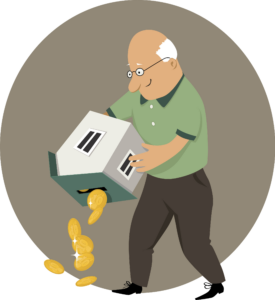 What is a reverse mortgage?
What is a reverse mortgage?
Can I sell property with a reverse mortgage? Should my grandma get a reverse mortgage?
With a conventional mortgage, a person borrows money from a bank and the bank files a mortgage on the person’s real estate. If the individual fails to pay back the loan to the bank, the bank uses its mortgage to sell the real estate. Simple enough. Most residential real estate transactions involve the buyer obtaining financing from a bank to purchase the real estate. The bank in turn files a mortgage during the process. The funds are distributed in a lump sum to the sellers. In a reverse mortgage scenario, funds are distributed slowly, over time to the party owning the real estate. The lending bank files a mortgage just like a traditional purchase money transaction.
Wait. Why would the bank make payments over a period of time to the consumer and not the other way around?
Commonly, elderly individuals that own their home and do not currently owe money against it utilize reverse mortgages. For example, if an elderly person owns their home free and clear of liens but is on a limited income, it can be difficult to pay for day-to-day expenses of living. At the same time, that person may have tens or hundreds of thousands of dollars in equity in their home. House rich and cash poor. A bank would likely not make a conventional loan to the individual because they have no source of income for repayment. The only option for this person may be to sell their home to realize the equity.
However, a reverse mortgage will loan the individual money, typically in the form of a monthly payment, and secure the loan with a mortgage on the house. This allows the person to realize their equity while remaining in their home. When the borrower passes away or moves out of the house, the mortgage company is either paid in full from the sale of the home or forecloses the property to sell and satisfy the debt.
Sounds decent, what’s the catch?
There are a few catches.
Unscrupulous Marketing
Many reverse mortgage companies use unsavory marketing tactics to target elderly folks. Oftentimes folks entering into reverse mortgages do not actually require the payment to live have been convinced otherwise.
Excessive Cost
Interest rates with reverse mortgages tend to be much higher than conventional loans and reverse mortgages can carry multitudes of hidden costs to the borrower. The interest also compounds over the life of the loan as opposed to a conventional loan, rendering reverse mortgages much more expensive. Even worse, many reverse mortgages will only provide monthly payments for a set amount of time. So, an elderly person living off reverse mortgage payments could still be forced to sell their home and then have no money left to live.
Fine Print
Lastly, reverse mortgages are difficult to understand. The documents are cumbersome for even a trained real estate or lending professional. These loans can be quite one-sided in favor of the lending institution, yet many consumers enter into these types of loans without fully understanding the fine print.
Can I sell a house with a reverse mortgage?
Sure, probably, maybe, perhaps.
Just like a conventional mortgage, if the underlying debt is paid, the mortgage will be released and the property may be sold free and clear of any liens. Problems arise when the debt owed against the real estate outweighs the value of the home. This is often the case with property subject to a reverse mortgage. It is possible that the bank could agree to a “short sale,” where the bank will agree to accept less than the amount of the debt. However, this process is typically quite cumbersome and can take several months to complete. Additionally, there are no guarantees the bank will agree to a short sale. Several months of negotiations could result in the property not being sold. Further, additional costs and interest continues to accrue while attempting to obtain a short sale arrangement.
Long story short, yes, a person may sell a house with a reverse mortgage. However, best practice would be to contact the bank and request a “payoff” prior to entering into a contract for sale. The payoff is the amount that the bank will accept for release of its lien. If the payoff is greater than the sales price, this may be an issue that could delay the transaction.
As stated above, reverse mortgages can be quite challenging to navigate in a transaction. That’s why Tallgrass Title has real estate professionals and attorneys on staff to assist in navigating these issues. Give us a call, it’s our job!


